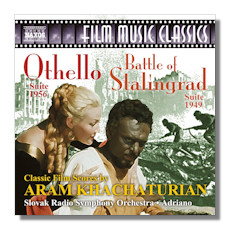
The Internet's Premier Classical Music Source
Related Links
- Khachaturian Reviews
- Latest Reviews
- More Reviews
-
By Composer
-
Collections
DVD & Blu-ray
Books
Concert Reviews
Articles/Interviews
Software
Audio
Search Amazon
Recommended Links
Site News
 CD Review
CD Review
Aram Khachaturian

Film Score Suites
- Suite "Othello" *
- Prologue and Introduction
- Desdemona's Arioso
- Vineyards
- Venice (Nocturne)
- Nocturnal Murder (Roderigo's Death)
- Othello's Despair
- A Fit of Jealousy
- Othello's Arrival
- The Striking of Desdemona (The Slap)
- Othello's Farewell from the Camp
- Finale
- Suite "The Battle of Stalingrad"
- A City on the Volga - The Invasion
- Stalingrad in Flames
- The Enemy is doomed
- For our Motherland; To the Attack! - Eternal Glory to the Heroes
- To Victory - There is a Cliff on the Volga
* Jana Valásková, soprano
* Viktor Šimčisko, violin
* Slovak Philharmonic Chorus
Slovak Radio Symphony Orchestra/Adriano
Naxos 8.573389 64m
Also available on Marco Polo 8.223314: Amazon - UK - Germany - Canada - France - Japan
Aram Khachaturian wrote seventeen film scores during his career and was highly regarded in the film genre in the Soviet Union. Here we have two of his more popular efforts, presented in the form of multi-movement suites. Actually, this disc is a reissue of material originally offered on Marco Polo in 1994. The Battle of Stalingrad was recorded in 1989 and Othello in 1992, but the sound reproduction for both works is quite excellent, competitive with many of the better recordings today.
The Battle of Stalingrad (1949) is a five-movement work lasting about a half hour. Probably its best music is heard in the first panel, A City on the Volga – The Invasion. It opens with a rather bombastic, brass-dominated theme of festive character and in the latter half features a militaristic march to represent the invasion of the city by the Nazis. The ensuing numbers, Stalingrad in Flames and The Enemy is Doomed, darken a bit in mood, but surprisingly show relatively little angst or overwrought feelings. Actually, for the most part, the emotional tenor of the music remains rather superficial, including in the closing movements that deal with patriotic feelings and victory. True, there's a sense of sincerity in the penultimate movement For Our Motherland: To the Attack! – Eternal Glory to the Heroes, but the finale, To Victory – There is a Cliff on the Volga, features the kind of superficial glorious music that would adapt well to a brass band. In fact, such an arrangement of the whole suite has been made and recorded, though I haven't heard it. Overall, this is a well-crafted score, light in character and akin to the sound world of Khachaturian's Gayaneh and Spartacus.
Othello is a different matter. While its expressive character doesn't go much deeper, its eleven movements offer a greater range of emotions and its scoring, which includes a solo soprano, chorus and solo violin, is both more varied and subtler. The opening number, Prologue and Introduction, is the longest movement, lasting nearly nine minutes. It features an attractive theme for solo violin, which is splendidly performed here by Viktor Šimčisko. The remaining numbers are all short, most lasting around two or three minutes. Desdemona's Arioso (#2) is quite a beautiful vocalise and is beautifully sung here by Jana Valásková. Nocturnal Murder (#5) and A Fit Of Jealousy (#7) offer sinister and quite atmospheric music. The chorus appears in the last two movements, Othello's Farewell from the Camp and Finale. Without doubt, Finale is the most effective number. Listening to it, with its mournful wordless choral writing, you might regret, as I did, that it didn't go on longer than its 3:39 duration. Overall, this is another fine effort by Khachaturian, a little more substantive than the score for The Battle of Stalingrad. By the way, it's not clear whether Khachaturian derived the suite from Othello (as he did for The Battle of Stalingrad) or if it was done by another hand. The composer's works list does not include this suite as far as I can determine. The album notes mention that Emin Khachaturian, nephew of the composer, had adapted some of the film's music for piano, but don't specify any further action by him.
Adriano draws fine performances from his vocal and instrumental forces and provides the very excellent notes on the music. Those with an interest in Khachaturian or in film music should find this disc a most welcome addition to their collection.
Copyright © 2014, Robert Cummings


















